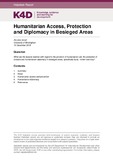| dc.contributor.author | Ismail, Zenobia | |
| dc.coverage.spatial | Syria | en |
| dc.coverage.spatial | Iraq | en |
| dc.coverage.spatial | Yemen | en |
| dc.date.accessioned | 2019-02-01T11:18:10Z | |
| dc.date.available | 2019-02-01T11:18:10Z | |
| dc.date.issued | 2018-12-10 | |
| dc.identifier.citation | Ismail, Z. (2018). Humanitarian Access, Protection and Diplomacy in Besieged Areas. K4D Helpdesk Report. Birmingham UK: University of Birmingham | en |
| dc.identifier.uri | https://opendocs.ids.ac.uk/opendocs/handle/20.500.12413/14311 | |
| dc.description.abstract | This rapid literature review examines the lessons learned in terms of providing humanitarian access and protection for civilians in besieged areas. The focus is on the following besieged areas: Syria (e.g. Raqqa, Aleppo, Deir-Ez-Zor and Eastern Ghouta), Hudaydah in Yemen and Mosul in Iraq. The recent literature is dominated by the conflict in Syria while there is very little in-depth analysis of humanitarian access in Hudaydah or Mosul. This review utilised grey literature produced by research organisations, Non-Governmental Organisations (NGOs) and humanitarian organisations as well as academic literature on humanitarian access. The findings reported in the literature were based on case study analyses which encompassed in-depth interviews with humanitarian actors and victims of conflict. | en |
| dc.language.iso | en | en |
| dc.publisher | IDS | en |
| dc.relation.ispartofseries | K4D Helpdesk Report;507 | |
| dc.rights.uri | https://www.nationalarchives.gov.uk/doc/open-government-licence/version/3/ | en |
| dc.subject | Aid | en |
| dc.subject | Rights | en |
| dc.subject | Social Protection | en |
| dc.title | Humanitarian Access, Protection, and Diplomacy in Besieged Areas | en |
| dc.type | Helpdesk | en |
| dc.rights.holder | © DFID - Crown copyright 2018. | en |
| dcterms.dateAccepted | 2018-12-10 | |
| rioxxterms.funder | Department for International Development, UK Government | en |
| rioxxterms.identifier.project | K4D | en |
| rioxxterms.version | VoR | en |
| rioxxterms.funder.project | 238a9fa4-fe4a-4380-996b-995f33607ba0 | en |

